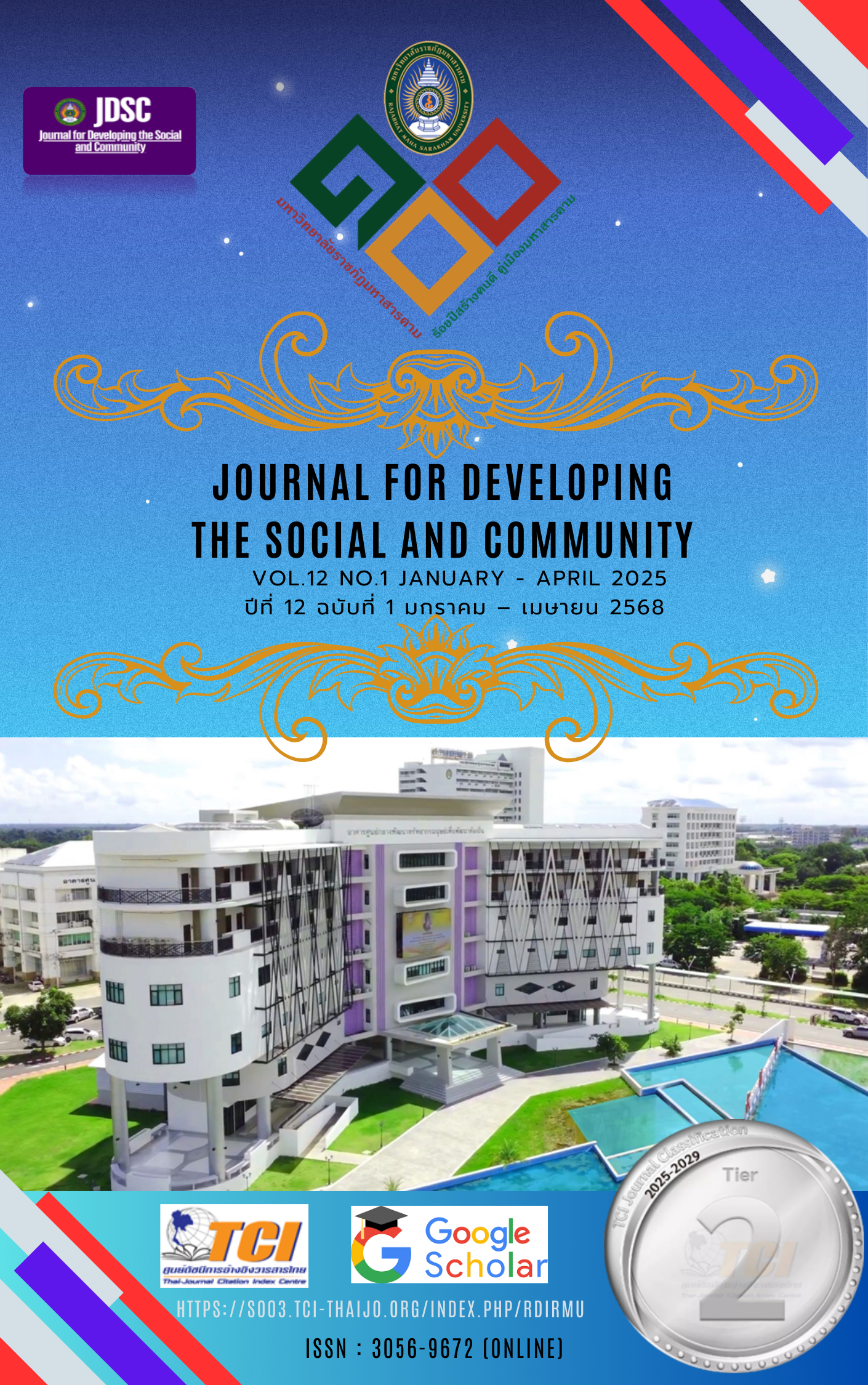The Desirable of School Administrators Characteristics in Sahawittayakhet Chonburi 2 under the Secondary Education service Area Office Chonburi Rayong
Keywords:
Desirable characteristics of educational administratorsAbstract
Background and Aims: School administrators play an important role in driving education to achieve its objectives, especially in the current era where organizations must be managed efficiently and have knowledge in leadership concepts and theories, science, art, and techniques that can be applied according to the context. The objectives of this research are: 1) to study the characteristics of school administrators who are desired in Chonburi 2 School-Cluster Campus, Chonburi Rayong Secondary Educational Service Area Office, and 2) to compare the characteristics of school administrators who are desired in Chonburi 2 School-Cluster Campus, Chonburi Rayong Secondary Educational Service Area Office, classified by gender, educational qualifications, and work experience.
Methodology: Quantitative research methodology was used with the sample group of 210 teachers in Chonburi 2 School-Cluster Campus, under the Office of the Chonburi Rayong Secondary Education Area Office. The data collection tools were questionnaires with a 5-level rating scale. Statistics used for data analysis included frequency distribution, percentage, reliability, content validity, mean, standard deviation, t-test, and one-way analysis of variance.
Results: It was found that the desirable characteristics of school administrators in Chonburi 2 School-Cluster Campus, Rayong Secondary Educational Service Area Office were at a moderate level overall. Each aspect was at a high level in 2 aspects: vision and personality. at a moderate level, 4 aspects: administrative ability, leadership, morality, ethics, and human relations. When comparing the desirable characteristics of school administrators in Chonburi 2 School-Cluster Campus, Rayong Secondary Educational Service Area Office classified by gender, educational qualifications, and work experience, it was found that teachers with different genders, educational qualifications, and work experience were significantly different overall at a statistical level of .05.
Conclusion: The characteristics of the desired school administrators in Chonburi 2 Sub-district, Chonburi Rayong Secondary Educational Service Area Office are overall at a moderate level. Therefore, school administrators should improve and develop the desired characteristics in a good direction so that educational administration can be carried out in accordance with the set objectives efficiently.
References
ปัญญา บัวบาน. (2565). คุณลักษณะที่พึงประสงค์ของผู้บริหารสถานศึกษาตามทัศนะของครูกลุ่มสหวิทยาเขตชลบุรี 1 สังกัดสำนักงานเขตพื้นที่การศึกษามัธยมศึกษาชลบุรี ระยอง. [วิทยานิพนธ์ศึกษาศาสตรมหาบัณฑิต]. มหาวิทยาลัยบูรพา.
พัชรินทร์ วงสาร และศันสนีย์ จะสุวรรณ. (2564). คุณลักษณะภาวะผู้นำในศตวรรษที่ 21 ของ ผู้บริหารสถานศึกษา. การประชุมวิชาการนำเสนอผลงานวิจัยระดับชาติและ นานาชาติครั้งที่ 14 "Global Goals, Local Actions: Looking Back and Moving Forward 2021" วันพุธที่ 18 สิงหาคม 2564.
ภัคปภา บัญญัติ. (2564). คุณลักษณะอันพึงประสงค์ของผู้บริหารในโรงเรียนมัธยมศึกษาจังหวัดปทุมธานี สังกัดสำนักงานเขตพื้นที่การศึกษามัธยมศึกษาปทุมธานี. [วิทยานิพนธ์ปริญญาศึกษาศาสตร].มหาบัณฑิต คณะครุศาสตร์อุตสาหกรรม]. มหาวิทยาลัยเทคโนโลยีราชมงคลธัญบุรี.
ศราวุฒิ ขันคำหมื่น. (2566) คุณลักษณะอันพึงประสงค์ของผู้บริหารสถานศึกษายุคประเทศไทย 4.0 สังกัดสำนักงานเขตพื้นที่การศึกษามัธยมศึกษาบุรีรัมย์. การศึกษาค้นคว้าอิสระศึกษาศาสตร์มหาบัณฑิต คณะศึกษาศาสตร์: มหาวิทยาลัยรามคำแหง.
สร้อยทิพย์ แก้วตา. (2565). คุณลักษณะของผู้บริหารสถานศึกษายุคใหม่ที่ส่งผลต่อสมรรถนะครูในศตวรรษที่ 21 สังกัดสำนักงานเขตพื้นที่การศึกษามัธยมศึกษาเพชรบูรณ์. หลักสูตรการศึกษามหาบัณฑิตสาขาวิชาการบริหารการศึกษา บัณฑิตวิทยาลัย มหาวิทยาลัยนเรศวร.
สำนักงานเขตพื้นที่การศึกษามัธยมศึกษาชลบุรี ระยอง. (2565). แผนพัฒนาการศึกษาขั้น พื้นฐาน พ.ศ. 2565 – 2567 สำนักงานเขตพื้นที่การศึกษามัธยมศึกษาชลบุรี ระยอง เอกสารหมายเลข 10/2564 กลุ่มนโยบายและแผน. สำนักงานเขตพื้นที่การศึกษามัธยมศึกษาชลบุรี ระยอง สำนักงานคณะกรรมการการศึกษาขั้นพื้นฐาน.
โสมวลี ชยามฤต. (2564). การพัฒนาทรัพยากรมนุษย์เพื่อรองรับยุคดิจิทัลขององค์การภาครัฐและ
เอกชน. วารสารสหวิทยาการมนุษยศาสตร์และสังคมศาสตร์, (41), 38-50.
อภิญญา สิงหา. (2565). กลยุทธ์การบริหารสถานศึกษาเพื่อส่งเสริมการเป็นโรงเรียนคุณธรรม. Journal of Modern Learning Development, (71), 155-168.
Cronbach, L. J. (1990). Essentials of psychological testing. New York: Harper & Row.
Hodgetts, R. M. (1999). Management Theory, Process and Practice. (Translated by C. Çetin and E. C. Mutlu). Istanbul: Beta Printing Distribution Inc.
Hoy, W. & Miskel, C. (2001). Educational Administration: Theory, Research and Practice (6thed.). New York: McGraw-Hill.
Krejcie, R. V. & Morgan, D. W. (1970). "Determining Sample Size for Research Activities". Educational and Psychological Measurement. Vol 30 No. 3. pp. 607-610.
Likert, Rensis. (1967). The Method of Constructing and Attitude Scale. Attitude Theory and Measurement. Fishbeic, Martin, Ed. New York: Wiley & Son.
Luthans, F. (1977). Organizational Behavior. (2nded). Tokyo : McGraw-Hill. Kagalusha.
Stogdill, Ralph M. 25. (1948). Personal Factors Associated with Leadership: A Survey of the Literature. Journal of Psychology, 25(1), 35-71.
Downloads
Published
How to Cite
Issue
Section
License
Copyright (c) 2025 Journal for Developing the Social and Community

This work is licensed under a Creative Commons Attribution-NonCommercial-NoDerivatives 4.0 International License.
Articles that are published are copyrighted by the authors of the articles







